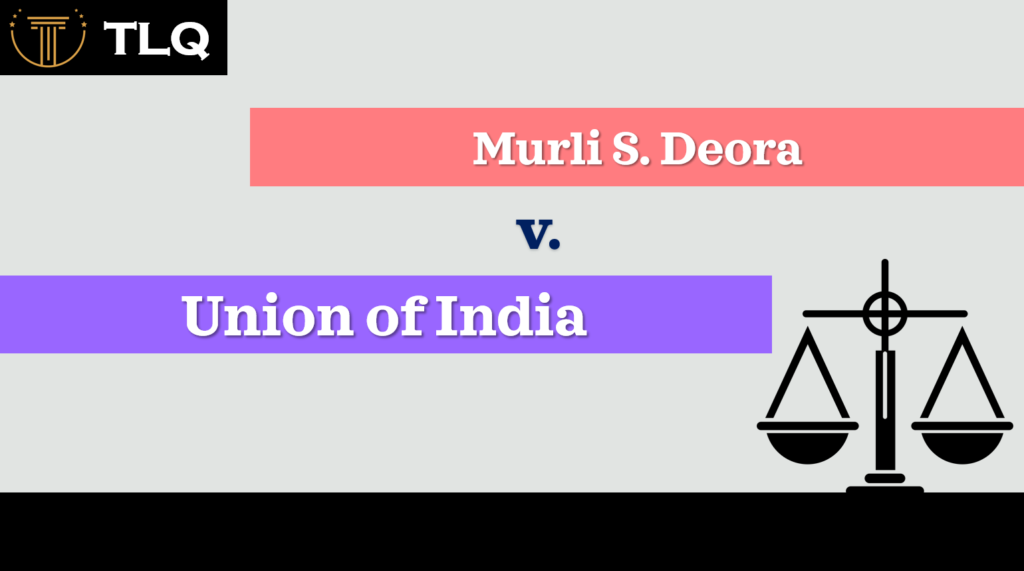Published on 18th February 2025
Authored By: Ahmad Aman Kazmi
Sharda University
Citation: AIR 1980 SC 319, (1980) 2 SCC 471
Court: Supreme Court of India
Bench: Justice V.R. Krishna Iyer, Justice D.A. Desai, and Justice O. Chinnappa Reddy
Introduction
The case State of Punjab v. Gurdial Singh addresses the critical issue of arbitrary state action in administrative law, particularly in land acquisition. It emphasizes fairness, reasonableness, and the need to uphold constitutional principles in the exercise of state power under the Land Acquisition Act, 1894. The judgment is an essential precedent in addressing abuse of discretionary powers by the executive.
Background Facts
Under Section 4 of the Land Acquisition Act, 1894, the State of Punjab notified its intent to acquire land for constructing a tube well colony. This notification affected the land of Gurdial Singh, among others. Singh alleged that the acquisition was motivated by malafide intent, primarily to benefit a private individual connected with the government, rather than for the stated public purpose.
Key claims by Singh included:
- The state had other suitable land available for the project.
- The choice of his land was arbitrary and discriminatory, and not based on rational criteria.
- The acquisition served a personal interest disguised as a public purpose.
The High Court ruled in favor of Gurdial Singh, quashing the acquisition proceedings. The State of Punjab appealed this decision to the Supreme Court.
Key Legal Provisions and Theories
- Land Acquisition Act, 1894:
- Section 4: Empowers the government to issue a preliminary notification indicating the intention to acquire land for a public purpose.
- Section 5A: Provides the right for affected persons to file objections.
- Section 6: Enables the government to make a final declaration of land acquisition after considering objections.
- Principles of Natural Justice:
- The judgment draws heavily on the theory of fairness and natural justice, emphasizing that state power must not be exercised arbitrarily or with malafide intent.
- It underscores the right to be heard (Audi alteram partem) before adversely affecting private rights.
- Judicial Review of Administrative Action:
- The judiciary’s power to review state actions derives from the constitutional principle that no action of the executive can violate fundamental rights or be based on malafide intentions.
- Article 14 of the Constitution (Equality before the Law) is invoked to challenge arbitrary state action.
Key Legal Issues
- Malafide Exercise of Power:
Can the acquisition of land be invalidated if it is proven to be motivated by malafide intentions? - Reasonableness and Fairness:
Does the state have an obligation to exercise its discretion reasonably and in good faith under the Land Acquisition Act? - Public Purpose:
How does the court determine whether land acquisition serves a genuine public purpose or is a guise for personal benefit?
Arguments Presented
State of Punjab (Appellant):
- The acquisition was for a public purpose—construction of a tube well colony—and followed due process under the Land Acquisition Act.
- No evidence supported the allegations of malafide intent. The land chosen was suitable for the stated purpose.
- Courts should not interfere in matters of executive discretion, especially when the action aligns with statutory requirements.
Gurdial Singh (Respondent):
- The acquisition was not genuinely for a public purpose but to benefit a private individual with influence over the decision-makers.
- The choice of Singh’s land was arbitrary, as other more suitable land was available.
- The state failed to provide valid reasons for targeting Singh’s land, violating principles of natural justice and fairness.
Judgment
- Malafide Exercise of Power:
The Court found that the state had acted with malafide intentions, which vitiated the entire acquisition process. Justice Krishna Iyer stated that the exercise of power must be “just, fair, and reasonable.” Any action tainted by malafide intent is unconstitutional and void. - Public Purpose and Fairness:
The Court emphasized that while public purpose is the cornerstone of land acquisition, it cannot be used as a pretext to serve private interests. The government must act transparently and provide evidence to justify its decisions. - Judicial Review and Article 14:
The Court reaffirmed the judiciary’s role in preventing arbitrary state action. It held that discretion under the Land Acquisition Act is not absolute and must conform to the principles of equality and non-arbitrariness enshrined in Article 14 of the Constitution.
Key Observations by the Court
- On Malafide Intent:
“Where power is exercised for a collateral purpose, it ceases to be a legitimate exercise of power.” - On Arbitrary Action:
“Arbitrariness is the very antithesis of the rule of law. Every state action must meet the test of reasonableness.” - On Judicial Review:
The Court emphasized that courts must intervene when executive actions appear to undermine constitutional principles or involve malafide motives.
Impact of the Judgment
- Check on State Power:
The judgment reinforced the idea that state power is not unfettered and must be exercised in accordance with constitutional principles. - Protection of Private Property:
It strengthened the protection of private property against arbitrary acquisition, ensuring that citizens are not unfairly deprived of their rights. - Importance of Public Purpose:
The case clarified that public purpose must be genuine, transparent, and substantiated by evidence. - Strengthened Rule of Law:
The decision highlighted the judiciary’s role as a watchdog against misuse of executive power.
Criticism and Challenges
- Judicial Overreach:
Critics argue that the judiciary, by scrutinizing executive decisions, may overstep its role and encroach on administrative functions. - Practical Challenges:
Proving malafide intent can be difficult, as it often requires substantial evidence of personal bias or ulterior motives. - Delays in Development:
Judicial intervention in land acquisition cases may delay public projects, potentially hindering economic development.
Legacy
The legacy of State of Punjab v. Gurdial Singh (1980) lies in its profound reinforcement of constitutional principles, particularly the rule of law, equality under Article 14, and fairness in administrative actions. The case set a high benchmark for judicial scrutiny of state powers, particularly in land acquisition cases, ensuring that government actions cannot be arbitrary, malafide, or driven by ulterior motives. By emphasizing the necessity of fairness and reasonableness, the judgment expanded the scope of judicial review, making the judiciary a robust guardian against executive excesses. It underscored that even statutory discretion must conform to constitutional values, thereby protecting individuals from unjust state actions. The decision’s insistence on genuine “public purpose” in land acquisition proceedings resonated in subsequent landmark rulings and influenced legislative reforms, including the Right to Fair Compensation and Transparency in Land Acquisition, Rehabilitation and Resettlement Act, 2013, which incorporated several safeguards against arbitrary land acquisition. Furthermore, the Court’s reliance on principles of natural justice—mandating that affected parties be treated fairly and their objections addressed—has since become a cornerstone of Indian administrative law, ensuring that no state action operates outside the bounds of accountability, transparency, and justice. This judgment continues to be a guiding precedent in cases involving allegations of misuse of power, favoritism, and procedural unfairness, cementing its place as a critical milestone in the evolution of Indian jurisprudence.




